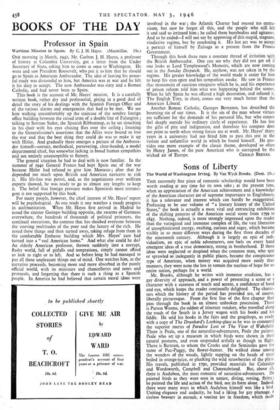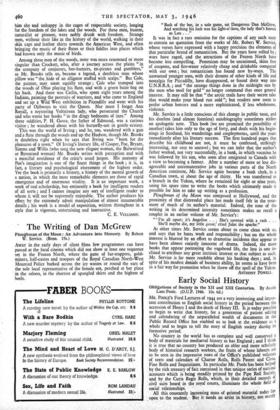Sons of Liberty .
The World of Washington Irving. By Van Wyck Brooks. (Dent. 15s.) Tins extremely fine piece of romantic scholarship would have been worth reading at any time for its own sake ; at the present time, when an appreciation of the American achievement and a knowledge of the American character are of supreme importance to Englishmen, it has a relevance and interest which can hardly be exaggerated. Professing to be one volume of " a literary history of the United States," the book is actually a most vital and entrancing exhibition of the shifting patterns of the American social scene from 1799 to 1845. Nothing, indeed, is more strongly impressed upon the reader than the variegated and immense complex of life, the vast liberation of unsophisticated energy, exulting, curious and eager, which became visible in so many different ways during the first three decades of the nineteenth century. Although it is largely an epic of indi- vidualism, an epic of noble adventurers, one feels on every hand emergent ideas of a true democracy, strong in brotherhood. If those ideas were neglected or despised when the common man, who spat or sprawled so inelegantly in public places, became the conspicuous type of American, when money was acquired more easily than manners, they were none the less to remain the nucleus of hope for an entire nation, perhaps for a world. Mr. Brooks, although he writes with immense erudition, has a gay diversity of approach, and a power of presenting a scene or a character with a sureness of touch and accent, a confidence of hand and eye, which keeps the reader continually delighted. The charac- ters which the history of the period has provided are, of course, liberally picturesque. From the first line of the, first Chapter they pass through the book in an almost unbroken procession. There is Parson Weems, the oddest of itinerant vendors, who travelled along the roads of the South in a Jersey wagon with his books and his fiddle. He sold his books in the fairs and the grogshops, as ready with a copy of The Drunkard's Looking-glass as he was to commend the superior merits of Paradise Lost or The Vicar of Wakefield. There is Peale, one of the naturalist-adventurers, Peale the painter, Peale who set up a museum in which birds were shown in their natural postures, and even suspended artfully as though in flight. There is Bartram, to whom the Creeks and the Seminoles gave the name of Puc-Puggy, the flower-hunter. He walked alone among the wonders of the woods, lightly supping on the heads of trout boiled in orange-juice, or plucking the wild strawberries of the plain. His travels, published in 1791, provided materials for Coleridge and Wordsworth, Campbell and Chateaubriand. But, above all, there is Audubon, the most romantic of naturalist-adventurers. He painted birds as they were seen in nature, diving, resting, flying ; he painted the life and action of the bird, not its form alone. Indeed, there were many ways in which Audubon himself was like a bird. Uniting elegance and audacity, he had a liking for gay plumage, a tireless bravery in pursuit. a soaring joy in freedom, which made
him shy and unhappy in the cages of respectable society, longing for the freedom of the lakes and the woods. For these men, hunter, naturalist or pioneer, were nobly drunk with freedom. Strange men, without their like in the history of the world, walking in their skin caps and leather shirts towards the American West, and often bringing the music of their flutes or their fiddles into places which had known only the music of birds.
Among these men of the woods, none was more renowned or more singular than Crockett, who, after a journey across the plains " in the company of conjurors, bee-hunters, ex-pirates and gamblers," as Mr. Brooks tells us, became a legend, a deathless man whose pillow was " the, hide of an alligator stuffed with scalps." But Cole, the painter, may seem equally strange ; Cole who tramped into the woods of Ohio playing his flute, and with a green baize bag on his back. And there was Catlin, who spent eight years among the Indians, painting the portraits of warriors, and who came to England and set up a Wild West exhibition in Piccadilly and went with his party of Ojibways to visit the Queen. Nor must I forget Ann Royall, a roystering Voltairean lady, who persecuted the Church and who wrote her books " in the dingy bedrooms of inns." Among these oddities, P. H. Gosse, the father of Edmund, was a curious visitor ; he wandered about with his butterfly-net in gentle ecstasy. This was the world of Irving ; and he, too, wandered with a gun and a flute through the woods and up the Hudson, though Mr. Brooks is doubtless right when he says that Irving was " born for the pleasures of a town." Of Irving's literary life, of Cooper, Poe, Bryant, Simms and Willis (who sang the new elegant woman, the Bulwerised or Byronised woman) Mr. Brooks writes with perception and with a merciful avoidance of the critic's usual jargon. His anatomy of Poe's imagination is one of the finest things in the book ; it is, in fact, a literary and psychological assessment of the highest order. Yet the book is primarily a history, a history of the mental growth of a nation, in which the most remarkable elements are those of rapid emergence and of enormous vitality. It is an important work, a work of real scholarship, but eminently a book for intelligent readers of all sorts ; and I cannot imagine any sort of intelligent reader to whom it will not be supremely enjoyable. The author produces his effect by the extremely adroit manipulation of almost innumerable details ; his work is a model of exposition, written throughout in a style that is vigorous, entertaining and instructive.
C. E. VULLIAMY.































 Previous page
Previous page